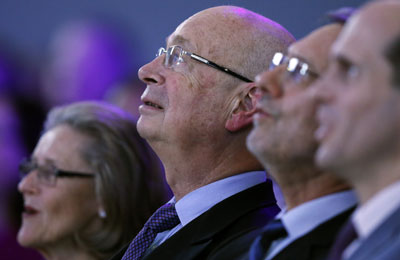
WEF founder Klaus Schwab (2nd L) sings
along The Davos Choir during the final
session of the forum.
No room for complacency warns forum
Davos, January 27, 2013
With the global economic crisis receding and concerns about Europe and the US subsiding, there is a danger of complacency, global business and civil society leaders warned.
“The optimism for recovery is there,” Axel A Weber, chairman of the board of directors of UBS, Switzerland, and a meeting co-chair of the 43rd World Economic Forum Annual Meeting, said. “The feeling is that the worst is behind us. But the mood bordered on complacency. On Wednesday, people talked about how the tail risk had been reduced. By Friday, the tail risk was removed!”
Fellow co-chair Frederico Curado, president and chief executive officer of Embraer, Brazil, agreed. “Hopefully, the good feelings this week were too optimistic but will translate into investments,” he said. “Jobs are the main issue. Unemployment is a huge issue for everyone.”
The role that central banks are playing to stimulate economies should not be overstated, Weber argued. “Central banks cannot resolve the deeper problems. So, the time that they have bought has to be used to make credible structural solutions. Deficits are okay if they are used to make investments. The mood has been good – too good to be true. Expectation management is in order.”
A key challenge for business, government and civil society is to restore trust in both public and private sector institutions. The crisis and the austerity measures that governments have introduced to address fiscal deficits have undermined confidence in corporate and political leaders. Implementing reforms and recovery plans fully – without letting politics stall them – is essential.
In Japan, for example, “the most important thing is to implement the new growth strategy thoroughly so that the recovery can lead to the rebirth of the Japanese economy,” meeting co-chair Atsutoshi Nishida, chairman of the Board of Toshiba Corporation, Japan, explained.
In China, meanwhile, the central challenge is to stay the course of transforming the economy into one based on domestic consumption, with balanced and sustainable growth. “The fundamental question is whether the necessary reforms will be carried out for the economy to continue to grow five years from now,” said Li Daokui, head, department of finance; director, Center for China in the World Economy (CCWE), Tsinghua University, People’s Republic of China.
All countries must also focus on addressing the persistent problem of corruption, concluded Huguette Labelle, chair of Transparency International, Germany, who is also a meeting co-chair. “The financial crisis is not over; corruption is not over.”
Under the theme Resilient Dynamism, the Annual Meeting 2013 saw much discussion on how leaders can inculcate greater strategic agility – the ability not just to manage risk but to adapt to it and still retain the capacity for risk taking when doing so might produce meaningful returns.
Nowhere was the relevance of the theme felt more than in the plenary session on “Scenarios for the Russian Federation” on the second day of the meeting. Asked what his policy priorities are for 2013, Prime Minister Dmitry Medvedev said Russia needs to “create a competitive environment, both domestically and globally”.
In a session on “The Global Financial Context”, Andrey Kostin, chairman and chief executive officer of VTB Bank, told participants that Russia would use its presidency of the G20 this year to drive further global regulation of the banking sector.
Participants also discussed the two-year civil war in Syria. With no resolution in sight, the conflict is creating a growing humanitarian crisis, with human suffering on a massive scale. This is placing an unsustainable burden on neighbouring countries that are taking in fleeing citizens. King Abdullah of Jordan urged the international community to do more to help the growing numbers of refugees.
Ahmet Davutoglu, Turkey’s Foreign Minister, meanwhile, said his country is helping to meet the humanitarian needs of the Syrian people, as well as helping opposition forces defend themselves.
The lack of progress on women’s rights, corruption and freedom of the press in the Arab world since the Arab Spring uprisings also came into focus. Asked whether women are better off now, Hesham Mohamed Qandil, Prime Minster of Egypt, defended progress in his country, saying that “the name of the game is that people can air their thoughts now”.
Ali M Z Ben Zedan, Prime Minister of Libya, and Abdelilah Benkirane, chief of Government of Morocco, both urged that reform must originate from the region rather than the West. - TradeArabia News Service







